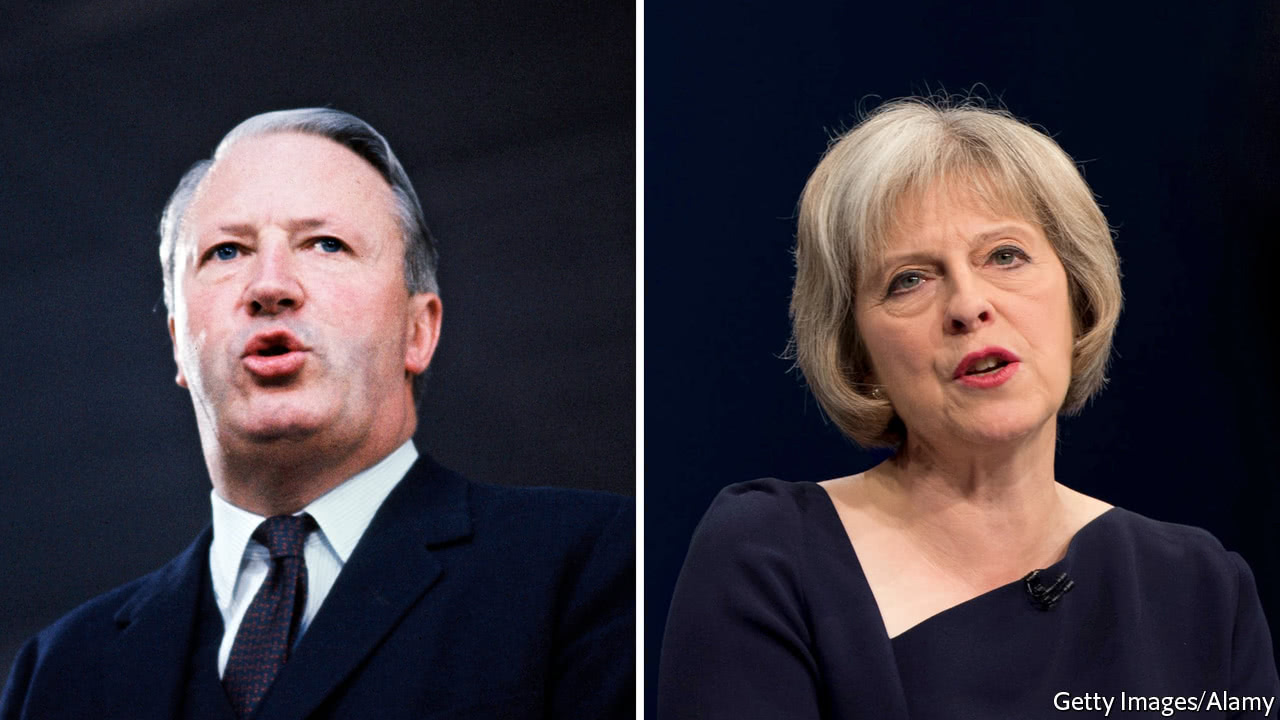
THE strange 1970s revival in Britain has another twist. The main focus has been on the Labour party which, under Jeremy Corbyn, wants to return to the era marked by nationalisation and higher taxes. But in a sense the Brexiteers want to take Britain back to the 1970s too; to the “golden era” before 1973 when the country was outside the EU.
In fact, the early 1970s were marked by strikes, power cuts and rapid inflation. They were presided over by Edward Heath (pictured left), the prime minister whose main achievement was to take Britain into what was then the European Economic Community. And it is striking how many similarities he had with the current prime minister, Theresa May (pictured right).
-
Republicans believe that America is now more respected under Donald Trump
-
Britain’s 1970s retread
-
Zimbabwe’s army mounts a coup against Robert Mugabe
-
Northern Ireland hasn’t had a government since January
-
Hungary’s Jobbik party tries to sound less extreme
-
The rise of Muhammad bin Salman
Both PMs were/are (Heath died in 2005) loners with few friends in the party and rather “buttoned-up” personalities. Both were uncomfortable on the campaign trail, finding it hard to connect with voters. Both talked of relaunching their party’s political philosophies but struggled to turn their principles into practical policy. Both called early elections and suffered disappointing results. Heath called a poll on the slogan “Who Governs Britain?” in February 1974; the result was a hung Parliament.
And both have been overwhelmed by turbulent times. Heath had to deal with a powerful miners’ union, the break-up of the Bretton Woods exchange-rate system, the economic impact of the Arab oil embargo of 1973 and IRA terrorism; Mrs May is stuck with negotiating Brexit (she backed Remain), a newly assertive Russia, a volatile American president and Islamic terrorism.
Another similarity is the febrile nature of politics. There was talk in the 1970s that Britain was ungovernable; some in the security services feared Harold Wilson, the Labour leader, was a Russian agent and there was talk of a coup. Things are not so bad this time round but the debate is getting increasingly heated. Judges who ruled that Parliament had to be involved in Brexit were dubbed “enemies of the people” by the Daily Mail; the same paper ran the headline “Crush the saboteurs” when Mrs May called the election. The latest kerfuffle concerns a government plan to enshrine the date of leaving the EU in law, a tactic that will only reduce the room for manoeuvre when the deadline approaches. When Tory backbenchers questioned the wisdom of this approach, a front page in the Daily Telegraph called them “Brexit mutineers” who were “refusing to endorse” the government; one MP has already received death threats as a result.
But there is a striking difference; the financial markets. Heath presided over a collapsing stockmarket and soaring bond yields; Mrs May has seen a slump in the pound but the FTSE 100 has hit record highs and the government can borrow at 1.3% for 10 years. One wonders, however, just what would happen if investors thought Mr Corbyn would actually get into power.
Source: economist
Britain's 1970s retread